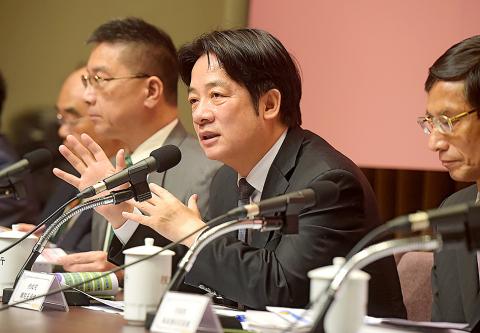The Cabinet yesterday unveiled a series of policies aimed at countering the nation’s low birthrate, including increasing the number of public childcare centers and kindergartens, working with private institutions to promote affordable “semi-public” childcare and preschool programs, and relaxing eligibility criteria for childcare subsidies.
The government has drafted several strategies to make childcare services and preschools more accessible and affordable, and increase the female labor force participation rate, Minister Without Portfolio Lin Wan-i (林萬億) said.
It would gradually increase the percentage of public childcare centers for children younger than two from 9.3 percent to 20 percent, and the percentage of public kindergartens designed for children aged two to five from 30 percent to 40 percent, he said.

Photo: Huang Yao-cheng, Taipei Times
It hopes that by 2022, an additional 5,280 children would be able to enjoy public childcare services and 60,000 more would attend public kindergartens, he said.
The government would also promote a program to help private childcare centers and kindergartens become “semi-public,” Lin said.
Private institutions that conform with building and safety regulations, meet the legal staff-to-child ratio and provide good services can sign contracts with the government to receive subsidies that would cover the difference between what parents can afford and their full rates, he said.
In return, semi-public institutions should allow parents to pay only 10 to 15 percent of their disposable income for the services, and raise the wages of childcare professionals and preschool teachers to at least NT$28,000 (US$937) and NT$29,000 respectively, he said.
The fees families will have to pay for semi-public childcare services and kindergartens would vary depending on their income, K12 Education Administration Deputy Director-General Hsu Li-chuan (許麗娟) said.
Children from low and medium-income families would be allowed to attend semi-public kindergartens for free, while other families would be charged NT$4,500 a month if the child was their first or second, and NT$3,500 if they were further down in birth order, she said.
The government would also relax eligibility criteria for childcare subsidies, Lin said.
Currently, parents of children younger than three can apply for a subsidy of NT$2,500 per month provided one of the parents are unemployed, they have not applied for a public unpaid parental leave subsidy and their income tax rate is less than 20 percent, he said.
These restrictions are to be eliminated starting in August next year, Hsu said.
Moreover, from August 2020, families with children aged three to four would be able to apply for the same subsidy, she said.
The Executive Yuan estimates that the new childcare services and preschools would benefit an additional 525,000 children, while the new childcare subsidies would help 523,000 more.
The policies would require NT$11.3 billion this year and NT$26 billion next year, Hsu said, adding that from 2020 onward the annual budget would be NT$38.3 billion.
“The government will continue to expand the number of public childcare centers and kindergartens. That goal will not change. We will allocate money for that from the annual general budget as well as the Forward-looking Infrastructure Development Program budget,” Premier William Lai (賴清德) said. “Ultimately, we hope to help parents meet their childcare needs, increase the salaries of childcare professionals and preschool teachers, as well as improve the quality and availability of childcare services.”

The CIA has a message for Chinese government officials worried about their place in Chinese President Xi Jinping’s (習近平) government: Come work with us. The agency released two Mandarin-language videos on social media on Thursday inviting disgruntled officials to contact the CIA. The recruitment videos posted on YouTube and X racked up more than 5 million views combined in their first day. The outreach comes as CIA Director John Ratcliffe has vowed to boost the agency’s use of intelligence from human sources and its focus on China, which has recently targeted US officials with its own espionage operations. The videos are “aimed at

STEADFAST FRIEND: The bills encourage increased Taiwan-US engagement and address China’s distortion of UN Resolution 2758 to isolate Taiwan internationally The Presidential Office yesterday thanked the US House of Representatives for unanimously passing two Taiwan-related bills highlighting its solid support for Taiwan’s democracy and global participation, and for deepening bilateral relations. One of the bills, the Taiwan Assurance Implementation Act, requires the US Department of State to periodically review its guidelines for engagement with Taiwan, and report to the US Congress on the guidelines and plans to lift self-imposed limitations on US-Taiwan engagement. The other bill is the Taiwan International Solidarity Act, which clarifies that UN Resolution 2758 does not address the issue of the representation of Taiwan or its people in

US Indo-Pacific Commander Admiral Samuel Paparo on Friday expressed concern over the rate at which China is diversifying its military exercises, the Financial Times (FT) reported on Saturday. “The rates of change on the depth and breadth of their exercises is the one non-linear effect that I’ve seen in the last year that wakes me up at night or keeps me up at night,” Paparo was quoted by FT as saying while attending the annual Sedona Forum at the McCain Institute in Arizona. Paparo also expressed concern over the speed with which China was expanding its military. While the US

SHIFT: Taiwan’s better-than-expected first-quarter GDP and signs of weakness in the US have driven global capital back to emerging markets, the central bank head said The central bank yesterday blamed market speculation for the steep rise in the local currency, and urged exporters and financial institutions to stay calm and stop panic sell-offs to avoid hurting their own profitability. The nation’s top monetary policymaker said that it would step in, if necessary, to maintain order and stability in the foreign exchange market. The remarks came as the NT dollar yesterday closed up NT$0.919 to NT$30.145 against the US dollar in Taipei trading, after rising as high as NT$29.59 in intraday trading. The local currency has surged 5.85 percent against the greenback over the past two sessions, central